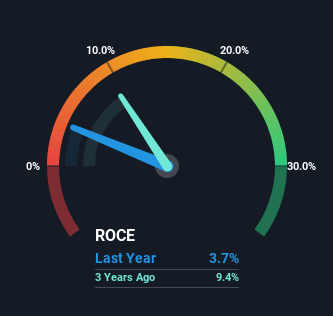Some Investors May Be Worried About Nath Bio-Genes (India)'s (NSE:NATHBIOGEN) Returns On Capital

If we want to find a potential multi-bagger, often there are underlying trends that can provide clues. Firstly, we'll want to see a proven return on capital employed (ROCE) that is increasing, and secondly, an expanding base of capital employed. Basically this means that a company has profitable initiatives that it can continue to reinvest in, which is a trait of a compounding machine. Having said that, from a first glance at Nath Bio-Genes (India) (NSE:NATHBIOGEN) we aren't jumping out of our chairs at how returns are trending, but let's have a deeper look.
Understanding Return On Capital Employed (ROCE)
For those who don't know, ROCE is a measure of a company's yearly pre-tax profit (its return), relative to the capital employed in the business. To calculate this metric for Nath Bio-Genes (India), this is the formula:
Return on Capital Employed = Earnings Before Interest and Tax (EBIT) ÷ (Total Assets - Current Liabilities)
0.037 = ₹213m ÷ (₹7.4b - ₹1.6b) (Based on the trailing twelve months to September 2022).
Therefore, Nath Bio-Genes (India) has an ROCE of 3.7%. In absolute terms, that's a low return and it also under-performs the Food industry average of 12%.
See our latest analysis for Nath Bio-Genes (India)

While the past is not representative of the future, it can be helpful to know how a company has performed historically, which is why we have this chart above. If you want to delve into the historical earnings, revenue and cash flow of Nath Bio-Genes (India), check out these free graphs here.
What Can We Tell From Nath Bio-Genes (India)'s ROCE Trend?
On the surface, the trend of ROCE at Nath Bio-Genes (India) doesn't inspire confidence. Around five years ago the returns on capital were 19%, but since then they've fallen to 3.7%. Given the business is employing more capital while revenue has slipped, this is a bit concerning. If this were to continue, you might be looking at a company that is trying to reinvest for growth but is actually losing market share since sales haven't increased.
On a related note, Nath Bio-Genes (India) has decreased its current liabilities to 22% of total assets. That could partly explain why the ROCE has dropped. Effectively this means their suppliers or short-term creditors are funding less of the business, which reduces some elements of risk. Some would claim this reduces the business' efficiency at generating ROCE since it is now funding more of the operations with its own money.
In Conclusion...
From the above analysis, we find it rather worrisome that returns on capital and sales for Nath Bio-Genes (India) have fallen, meanwhile the business is employing more capital than it was five years ago. Long term shareholders who've owned the stock over the last five years have experienced a 67% depreciation in their investment, so it appears the market might not like these trends either. With underlying trends that aren't great in these areas, we'd consider looking elsewhere.
On a final note, we found 3 warning signs for Nath Bio-Genes (India) (2 shouldn't be ignored) you should be aware of.
For those who like to invest in solid companies, check out this free list of companies with solid balance sheets and high returns on equity.
If you're looking to trade Nath Bio-Genes (India), open an account with the lowest-cost platform trusted by professionals, Interactive Brokers.
With clients in over 200 countries and territories, and access to 160 markets, IBKR lets you trade stocks, options, futures, forex, bonds and funds from a single integrated account.
Enjoy no hidden fees, no account minimums, and FX conversion rates as low as 0.03%, far better than what most brokers offer.
Sponsored ContentValuation is complex, but we're here to simplify it.
Discover if Nath Bio-Genes (India) might be undervalued or overvalued with our detailed analysis, featuring fair value estimates, potential risks, dividends, insider trades, and its financial condition.
Access Free AnalysisHave feedback on this article? Concerned about the content? Get in touch with us directly. Alternatively, email editorial-team (at) simplywallst.com.
This article by Simply Wall St is general in nature. We provide commentary based on historical data and analyst forecasts only using an unbiased methodology and our articles are not intended to be financial advice. It does not constitute a recommendation to buy or sell any stock, and does not take account of your objectives, or your financial situation. We aim to bring you long-term focused analysis driven by fundamental data. Note that our analysis may not factor in the latest price-sensitive company announcements or qualitative material. Simply Wall St has no position in any stocks mentioned.
About NSEI:NATHBIOGEN
Nath Bio-Genes (India)
Engages in the production, processing, and marketing of hybrid and GM seeds in India and internationally.
Adequate balance sheet second-rate dividend payer.
Similar Companies
Market Insights
Community Narratives



